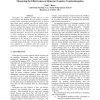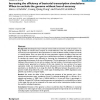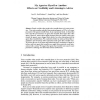24 search results - page 1 / 5 » Perverse Effects in Defense of Computer Systems: When More i... |
ACSAC
2000
IEEE
14 years 1 months ago
2000
IEEE
In this paper we describe a new class of tools for protecting computer systems from security attacks. Their distinguished feature is the principle they are based on. Host or netwo...
HICSS
2006
IEEE
14 years 3 months ago
2006
IEEE
Honeypots are computer systems that try to fool cyberattackers into thinking they are ordinary computer systems, when in fact they are designed solely to collect data about attack...
BMCBI
2008
13 years 9 months ago
2008
Background: Simulating the major molecular events inside an Escherichia coli cell can lead to a very large number of reactions that compose its overall behaviour. Not only should ...
DPPI
2007
ACM
14 years 1 months ago
2007
ACM
Abstract. People consider other people who resemble them to be more persuasive. Users may consider embodied conversational agents, or ECAs, to be more persuasive if the agents rese...
IPPS
2007
IEEE
14 years 3 months ago
2007
IEEE
This paper proposes a dynamic scheduler that supports the coexistence of guaranteed and non-guaranteed bandwidth servers to efficiently handle soft-tasks’ overloads by making a...



